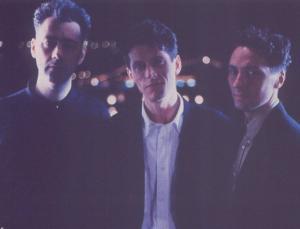Blue Nile

Taking the Time to Listen
By Hector E. Ramos Ramos
(December 2010)
I go to music for respite from the ringing bells and digitized alarm clock clanging through those segments and regiments of my responsible life. I prefer that my stay in this refuge be as different as possible from my usual time-regulated surroundings. For me, that's translated into a weakness for a certain languor in music itself. It might be that I perceive music that goes at its own pace to be rebelling against the velocity I'm all too acquainted with in my everyday routine. I like to be reminded that, in certain contexts, sluggishness (not haste) is the means to success. Such is the case of the Blue Nile, a Glaswegian sophisti-pop unit whose tortoise-like m.o. might be the key to its allure.The Blue Nile, shorthand for singer Paul Buchanan and his fellow Scots, Robert Bell, and Paul Joseph Moore, began their career in earnest after Linn Electronics heard their initial single and offered them a deal to record an album. Linn considered them the perfect ambassadors for their advanced sonic equipment. On their debut LP, 1984's A Walk Across the Rooftops, the Blue Nile not only promote Linn's high-end technology, but also showcase the magic available in moments of repose, the details audible when the space of a song is unrushed and left to grow and its rhythms relaxed. In the ensuing twenty-five years, they have taken this idiosyncratic approach and sauntered with it.
If you go ahead and count the almost-handful of albums the Blue Nile have released through their career, you can surmise their recording schedule isn't exactly agitated. The records themselves sound so meticulously constructed you'd swear the players treated any deadline which loomed over them as a mere suggestion. Meeting it must have been secondary to ensuring that the music's promise was fulfilled on record. When I listen to the Blue Nile, I get the impression the possibilities of their songs wouldn't be explored properly if they didn't let them inhale and exhale and take a couple of siestas before the end of their running times, which are usually more than double the length of the average pop song. It's not that the Blue Nile don't do pop, though it's more like their idea of music doesn't conform to any orthodoxy that would define 'pop' as necessarily abbreviated and bite-sized. Theirs are songs to be sipped like juleps and reclined on like umbrella-shadowed chaises lounges.
Just as it's a stretch for the imagination to picture the millions of molecules at work when a breeze makes sway the wide leaves of a palm tree, it's hard to think any labor goes into the Blue Nile's luxuriant, laid-back tunes, though it's obvious they've emerged after much hard work . The best album they've put out thus far, 1989's Hats, hides careful craftsmanship under arrangements that seem as improvised as the contours a rising tide leaves behind when it pours over onto the beach. On Hats, the pause that follows a synthesized sigh or lets a keyboard chord linger awhile in negative space is as natural as the unexpected stops that follow long-sustained cricket chirps. Then there's Buchanan's voice- unpolished and uncertain enough to offset the Blue Nile's sleek urbanity. The wounded yodel, always either lovelorn or love-struck, allows the cosmopolitan observer who inhabits the band's songs to render his pain believable without coming off as bitter or hard-bitten. While it would be disingenuous to call the Blue Nile's members ingénues, the truth is that their finely wrought music, especially on Hats and their debut, sound genuinely uncontrived though it is the product of significant toil and prolonged gestation.
An almost completely electronic album, Hats resembles a carefully tended rock garden in the way it recreates the unobstructed beauty we like nature to provide and which we too rarely see. Like one of those gardens, the record eludes the oppressive rhythms of contemporary life and has its own internal logic divorced from everyday harshness. Yet, unlike a shrine more appropriate to a bucolic past, Hats is clearly the work of people who live in the heart of modern life. The album's songs lyrically portray and sonically evoke the disappointment and excitement which are the city's stock in trade. They voice a desire to attain relief from the humdrum and freedom from drabness. The Blue Nile suggest a remedy for malaise in the sort of love that can give a new glow to the headlights and streetlight that populate their songs. Other times, it is just beyond our grasp, in a utopia that Buchanan tells us lies "over the hillside."
The Blue Nile have made a career of meditating on the magic and sadness to be found under high rise canopies. They bring into focus those transcendent aspects of city-life that country mice dream of and town mice rarely see and even more rarely notice. And while it's the town that's largely responsible for the regime of the punch clock and the closing bell that I routinely do my best to forget, it's obvious that without it, entering a world like the one the Blue Nile weave together wouldn't be as powerful an experience. While the city envisioned on Hats will seem a fantasy to most of us, it's difficult to deny the irresistible escapism it offers.